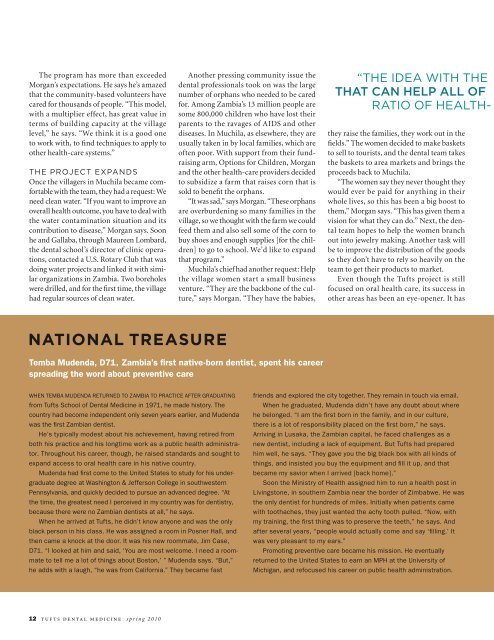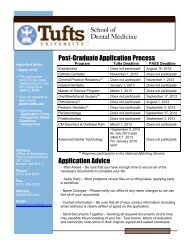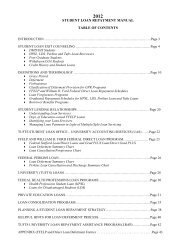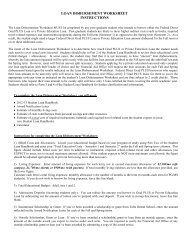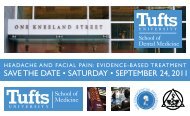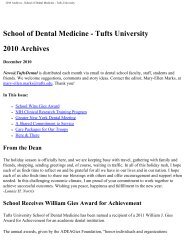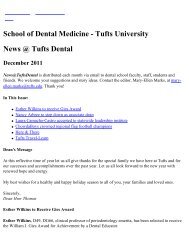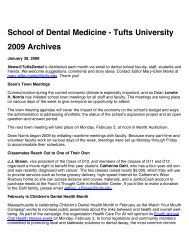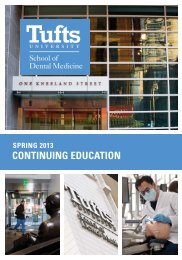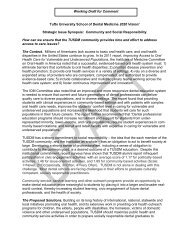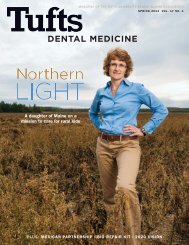Spring 2010 - Tufts University School of Dental Medicine
Spring 2010 - Tufts University School of Dental Medicine
Spring 2010 - Tufts University School of Dental Medicine
Create successful ePaper yourself
Turn your PDF publications into a flip-book with our unique Google optimized e-Paper software.
The program has more than exceeded<br />
Morgan’s expectations. He says he’s amazed<br />
that the community-based volunteers have<br />
cared for thousands <strong>of</strong> people. “This model,<br />
with a multiplier effect, has great value in<br />
terms <strong>of</strong> building capacity at the village<br />
level,” he says. “We think it is a good one<br />
to work with, to find techniques to apply to<br />
other health-care systems.”<br />
<br />
Once the villagers in Muchila became comfortable<br />
with the team, they had a request: We<br />
need clean water. “If you want to improve an<br />
overall health outcome, you have to deal with<br />
the water contamination situation and its<br />
contribution to disease,” Morgan says. Soon<br />
he and Gallaba, through Maureen Lombard,<br />
the dental school’s director <strong>of</strong> clinic operations,<br />
contacted a U.S. Rotary Club that was<br />
doing water projects and linked it with similar<br />
organizations in Zambia. Two boreholes<br />
were drilled, and for the first time, the village<br />
had regular sources <strong>of</strong> clean water.<br />
Another pressing community issue the<br />
dental pr<strong>of</strong>essionals took on was the large<br />
number <strong>of</strong> orphans who needed to be cared<br />
for. Among Zambia’s 13 million people are<br />
some 800,000 children who have lost their<br />
parents to the ravages <strong>of</strong> AIDS and other<br />
diseases. In Muchila, as elsewhere, they are<br />
usually taken in by local families, which are<br />
<strong>of</strong>ten poor. With support from their fundraising<br />
arm, Options for Children, Morgan<br />
and the other health-care providers decided<br />
to subsidize a farm that raises corn that is<br />
sold to benefit the orphans.<br />
“It was sad,” says Morgan. “These orphans<br />
are overburdening so many families in the<br />
village, so we thought with the farm we could<br />
feed them and also sell some <strong>of</strong> the corn to<br />
buy shoes and enough supplies [for the children]<br />
to go to school. We’d like to expand<br />
that program.”<br />
Muchila’s chief had another request: Help<br />
the village women start a small business<br />
venture. “They are the backbone <strong>of</strong> the culture,”<br />
says Morgan. “They have the babies,<br />
<br />
<br />
<br />
they raise the families, they work out in the<br />
fields.” The women decided to make baskets<br />
to sell to tourists, and the dental team takes<br />
the baskets to area markets and brings the<br />
proceeds back to Muchila.<br />
“The women say they never thought they<br />
would ever be paid for anything in their<br />
whole lives, so this has been a big boost to<br />
them,” Morgan says. “This has given them a<br />
vision for what they can do.” Next, the dental<br />
team hopes to help the women branch<br />
out into jewelry making. Another task will<br />
be to improve the distribution <strong>of</strong> the goods<br />
so they don’t have to rely so heavily on the<br />
team to get their products to market.<br />
Even though the <strong>Tufts</strong> project is still<br />
focused on oral health care, its success in<br />
other areas has been an eye-opener. It has<br />
<br />
Temba Mudenda, D71, Zambia’s first native-born dentist, spent his career<br />
spreading the word about preventive care<br />
WHEN TEMBA MUDENDA RETURNED TO ZAMBIA TO PRACTICE AFTER GRADUATING<br />
from <strong>Tufts</strong> <strong>School</strong> <strong>of</strong> <strong>Dental</strong> <strong>Medicine</strong> in 1971, he made history. The<br />
country had become independent only seven years earlier, and Mudenda<br />
was the first Zambian dentist.<br />
He’s typically modest about his achievement, having retired from<br />
both his practice and his longtime work as a public health administrator.<br />
Throughout his career, though, he raised standards and sought to<br />
expand access to oral health care in his native country.<br />
Mudenda had first come to the United States to study for his undergraduate<br />
degree at Washington & Jefferson College in southwestern<br />
Pennsylvania, and quickly decided to pursue an advanced degree. “At<br />
the time, the greatest need I perceived in my country was for dentistry,<br />
because there were no Zambian dentists at all,” he says.<br />
When he arrived at <strong>Tufts</strong>, he didn’t know anyone and was the only<br />
black person in his class. He was assigned a room in Posner Hall, and<br />
then came a knock at the door. It was his new roommate, Jim Case,<br />
D71. “I looked at him and said, ‘You are most welcome. I need a roommate<br />
to tell me a lot <strong>of</strong> things about Boston,’ ” Mudenda says. “But,”<br />
he adds with a laugh, “he was from California.” They became fast<br />
friends and explored the city together. They remain in touch via email.<br />
When he graduated, Mudenda didn’t have any doubt about where<br />
he belonged. “I am the first born in the family, and in our culture,<br />
there is a lot <strong>of</strong> responsibility placed on the first born,” he says.<br />
Arriving in Lusaka, the Zambian capital, he faced challenges as a<br />
new dentist, including a lack <strong>of</strong> equipment. But <strong>Tufts</strong> had prepared<br />
him well, he says. “They gave you the big black box with all kinds <strong>of</strong><br />
things, and insisted you buy the equipment and fill it up, and that<br />
became my savior when I arrived [back home].”<br />
Soon the Ministry <strong>of</strong> Health assigned him to run a health post in<br />
Livingstone, in southern Zambia near the border <strong>of</strong> Zimbabwe. He was<br />
the only dentist for hundreds <strong>of</strong> miles. Initially when patients came<br />
with toothaches, they just wanted the achy tooth pulled. “Now, with<br />
my training, the first thing was to preserve the teeth,” he says. And<br />
after several years, “people would actually come and say ‘filling.’ It<br />
was very pleasant to my ears.”<br />
Promoting preventive care became his mission. He eventually<br />
returned to the United States to earn an MPH at the <strong>University</strong> <strong>of</strong><br />
Michigan, and refocused his career on public health administration.<br />
12 tufts de ntal medicine sp r i n g 20 1 0


